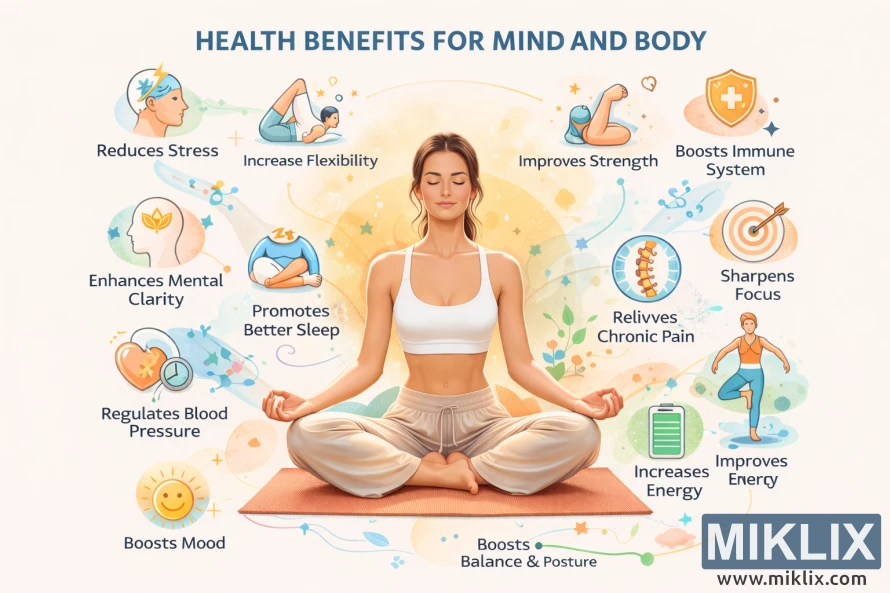From Flexibility to Stress Relief: The Complete Health Benefits of Yoga
Published: April 5, 2025 at 5:23:38 PM UTC
Last updated: December 24, 2025 at 1:43:01 PM UTC
Yoga is a holistic practice that offers numerous health benefits, improving both mental and physical health. Its roots trace back to ancient India, combining postures, breathing techniques, and meditation for overall well-being. Practitioners experience enhanced flexibility and strength, along with deep relaxation. Studies support yoga's benefits, making it a popular choice for people of all ages and fitness levels seeking optimal health.

Key Takeaways
- Yoga enhances physical flexibility and strength.
- Practicing yoga contributes positively to mental health.
- It promotes relaxation and reduces stress.
- Yoga is accessible for all ages and fitness levels.
- Numerous studies validate the health benefits of yoga.
Introduction to Yoga and Its Ancient Roots
Yoga's history is deeply rooted in ancient India, where it emerged as a means to enhance spiritual growth. The term "yoga" comes from the Sanskrit "yuj," meaning "to yoke." This highlights yoga's goal of connecting different aspects of life. Through the ages, yoga has evolved, yet it remains focused on the mind-body connection.
The origins of yoga are found in ancient texts like the Rig Veda, which defines yoga as "yoking" or "discipline." The practice grew with insights from the Brahmans and Rishis, documented in the Upanishads. The Bhagavad Gita, written around 500 B.C.E., showcases yoga's role in spiritual growth. It emphasizes meditation and contemplation as key components of the yogic journey.
Improved Strength, Balance, and Flexibility
Practicing yoga significantly enhances strength, balance, and flexibility, making it essential for all ages. Engaging in various yoga poses helps build muscle strength through controlled movements and holds. For example, poses like the Warrior II require considerable strength and stability. They promote overall body strength while improving coordination.
The focus on balance is a key aspect of yoga practice. Poses such as the Tree Pose challenge an individual's balance, requiring active engagement of core muscles and lower body strength. This practice sharpens balance and enhances physical coordination. It's vital for maintaining mobility throughout life.
Flexibility is another benefit gained from consistent yoga practice. The combination of stretching and strengthening in each session promotes an increase in muscle flexibility. Improved flexibility alleviates muscle tension, reduces the risk of injury, and supports overall physical health. It's highly beneficial for older adults.
Yoga for Back Pain Relief
Research shows yoga therapy is a powerful tool for back pain relief. A study backed by the National Institutes of Health found weekly yoga classes as effective as intensive stretching. They reduced low back pain and improved movement. The benefits lasted for months after treatment.
The American College of Physicians recommends yoga as a primary treatment for chronic pain. This highlights its value for those dealing with ongoing discomfort.
Certain yoga poses, like Cat-Cow, enhance spinal mobility and flexibility. Adding poses like kneeling three-way lunges and low runner's lunge with a twist can reduce hip tension. These moves improve overall body function and performance in activities like running.
Yoga focuses on body awareness, helping individuals manage pain effectively. Through mindful movement and breath control, participants often see a decrease in chronic pain symptoms. Incorporating yoga into daily life offers a holistic approach to relief and well-being.
Alleviating Arthritis Symptoms with Yoga
Gentle yoga offers a powerful way to ease arthritis symptoms like joint pain and swelling. Studies from trusted sources reveal that those who practice yoga see notable improvements. They often report less pain and better joint mobility. These exercises are low-impact, making them accessible to people with different physical abilities.
Adding gentle yoga to your daily routine can help reduce soreness and boost overall health. It promotes flexibility and lets you move at your own speed. Regular practice not only controls arthritis symptoms but also improves your life quality. It supports both physical and emotional health.
Heart Health and Yoga
Regular yoga practice is a significant contributor to heart health. It offers stress reduction, which is vital for a healthy cardiovascular system. High stress levels can cause inflammation and raise blood pressure, both risk factors for heart disease.
Studies show yoga's cardiovascular benefits, like lowering blood pressure and managing weight. Techniques like pranayama, or yogic breathing, promote relaxation and enhance circulatory function. By incorporating these practices into daily routines, individuals can positively impact their heart health.
Yoga also encourages a mindful approach to physical fitness, promoting lifelong habits. Regular yoga practice helps reduce key risk factors for heart disease. This provides a holistic approach to maintaining cardiovascular well-being.

How Yoga Improves Sleep Quality
Many people face challenges with sleep quality, often dealing with insomnia and restless nights. Adding consistent bedtime yoga routines can improve sleep. Gentle movements and mindful breathing calm the mind, leading to relaxation essential for a good night's sleep.
Specific yoga poses for sleep, like Legs-Up-the-Wall, are very effective. This pose improves circulation and muscle release, helping the body relax. Studies show yoga can greatly reduce insomnia symptoms by tackling both mental and physical barriers to sleep.
Introducing yoga into your evening routine can create a sleep-friendly atmosphere. By practicing yoga before bed, you might find it easier to fall asleep.
Boosting Mental Energy and Mood with Yoga
Yoga is a potent tool for boosting mental energy and improving mood. Many experience a notable surge in enthusiasm and alertness after regular yoga sessions. The combination of physical postures, mindfulness, and controlled breathing boosts overall well-being.
Adding yoga to daily routines offers significant benefits, including lower anxiety and depression. This practice helps build resilience against negative emotions, leading to a more optimistic outlook. Yoga enables individuals to better manage stress and maintain mental clarity.
Yoga practice fosters a steady flow of mental energy, preparing individuals to tackle life's hurdles. Through various postures and breathing methods, practitioners not only strengthen their bodies but also sharpen their minds. These effects contribute to emotional stability, making yoga a key practice for mental wellness.
Yoga as a Tool for Stress Management
In today's fast-paced world, stress is a common challenge affecting both physical and mental health. Yoga emerges as an effective tool for managing stress by promoting mindfulness and improving mental health. Scientific research backs the claim that regular yoga practice reduces anxiety and enhances overall quality of life.
Deep breathing and meditation in yoga routines significantly contribute to mental well-being. These practices help balance the mind and induce relaxation. This enables practitioners to handle daily stressors more effectively. Yoga encourages individuals to focus on the present moment, fostering a sense of calmness vital for stress management.
Yoga also fosters self-reflection, making participants more aware of their thoughts and emotions. This heightened awareness equips individuals with the tools to handle stress, strengthening the connection between the mind and body. Incorporating yoga into daily routines can lead to significant improvements in stress management and mental health.
Finding Community Through Yoga
Yoga classes do more than just improve physical health; they help people find a supportive community. The group setting creates a space for connections, helping to combat loneliness. It's a place where people can share their stories and experiences, fostering a sense of belonging.
This sense of social support is incredibly valuable. It motivates and encourages individuals to continue their yoga practice. The bonds formed in these classes often extend beyond the mat, providing ongoing support and motivation.
Group healing in yoga classes offers a collective journey towards well-being. Participants can openly discuss their struggles and successes, strengthening the sense of community. These emotional connections significantly enhance mental health, creating a positive and resilient environment.

Promoting Self-Care Through Yoga Practices
Yoga offers a deep path to self-care, allowing individuals to discover wellness practices that match their unique needs. This ancient practice connects the mind, body, and spirit, promoting a holistic health approach. It helps people become more aware of their physical and mental states, encouraging them to prioritize self-care daily.
Studies show yoga's benefits in managing chronic pain and boosting mental health. By personalizing their yoga routines, practitioners can address specific issues, whether physical or emotional. This customization boosts their self-care commitment.
Adding yoga to a wellness routine brings numerous advantages:
- Enhancement of physical flexibility and strength.
- Reduction of stress and anxiety levels.
- Improvement in overall mental clarity and focus.
- Encouragement of mindfulness and self-reflection.
As people learn to appreciate their bodies and listen to their needs, yoga becomes a key part of their self-care. Embracing these practices not only nurtures individual well-being but also deepens the connection to oneself.
The Role of Yoga in Mental Health Improvement
Yoga therapy is increasingly recognized as a valuable tool for mental health improvement. It is beneficial for those dealing with depression and anxiety. Studies show that yoga can be a key part of mental health treatment plans. The combination of physical movement and controlled breathing in yoga helps reduce symptoms of major depressive disorder (MDD).
Yoga offers unique benefits for emotional and psychological well-being:
- Promotes emotional awareness, allowing individuals to connect more deeply with their feelings.
- Enhances coping mechanisms, providing tools to deal with stress and anxiety.
- Supports mindfulness, leading to greater presence and focus.
- Encourages community and social support, which can further bolster mental health.
Incorporating yoga into daily routines offers a holistic approach to mental health care. It addresses the mind-body connection, improving personal experiences and long-term psychological health. Yoga therapy builds resilience, helping individuals manage depression and other mental health challenges.
Yoga for Enhancing Body Awareness and Posture
In today's fast-paced world, maintaining good health is more important than ever. Sedentary lifestyles lead to physical ailments. Yoga offers a solution by improving body awareness through various poses. These poses enhance flexibility and strengthen the mind-body connection.
Regular yoga practice significantly boosts one's ability to recognize bodily sensations. This leads to better alignment in daily activities. It prevents discomfort and injuries caused by poor posture.
Adding yoga postures to daily routines improves posture. Simple poses like Mountain Pose and Warrior I can be done anywhere. They promote better ergonomics and physical health. Just a few minutes of these practices can greatly enhance overall wellness.
Yoga's Influence on Immunity and Overall Wellness
Regular yoga practice boosts immunity and promotes overall wellness. Studies show yoga can lower pro-inflammatory markers like IL-1beta, IL-6, and TNF-alpha. This is good for those at risk of or already dealing with inflammatory diseases.
Experts show lower inflammatory markers than beginners. This shows yoga's role in reducing inflammation. It suggests yoga can lessen the body's stress response, helping it cope better with stressors.
A review of trials confirms yoga strengthens immune function in both the healthy and those with medical conditions. Yoga's mix of physical postures, breathing, and meditation lowers cortisol and boosts BDNF. These changes hint at yoga's protective effects on brain health.
Yoga combines mindfulness with physical activity, making it a valuable tool for immunity and wellness. It builds resilience against illness and promotes a holistic health approach, benefiting both body and mind.

Yoga's Impact on Cardiovascular Functioning
Yoga practices are a key to maintaining cardiovascular health, providing a holistic approach to heart function. Techniques like pranayama and yogic breathing are central, designed to boost oxygen flow and relaxation. These exercises lead to better blood circulation, improving cardiovascular health metrics.
Studies show that yogic breathing in daily routines can manage blood pressure and heart rate. This is great for those aiming to enhance heart function. Deep, rhythmic breathing calms the autonomic nervous system, which controls vital body processes.
Yoga not only benefits the heart physically but also boosts mental well-being. It combines physical postures with controlled breathing, deepening the connection to bodily sensations. This aids in stress reduction, a critical factor in cardiovascular health, highlighting the need for a balanced lifestyle.
Conclusion
Yoga is a vital part of a healthy lifestyle, blending ancient wisdom with modern benefits. It enhances physical strength, balance, and flexibility. It also boosts mental clarity and emotional resilience. Through yoga, people connect deeply with their bodies and minds, enjoying a holistic experience.
Adding yoga to daily routines boosts overall well-being. It helps reduce stress and illness. As one commits to yoga, they find happiness and health, ready to tackle life's hurdles with confidence.
Exploring different yoga styles helps find the perfect fit for personal needs and goals. Yoga is more than exercise; it's a journey to wellness and self-discovery.

Further Reading
If you enjoyed this post, you may also like these suggestions:
- How CrossFit Transforms Your Body and Mind: Science-Backed Benefits
- Why Cycling Is One of the Best Exercises for Your Body and Mind
- How Swimming Improves Physical and Mental Health
